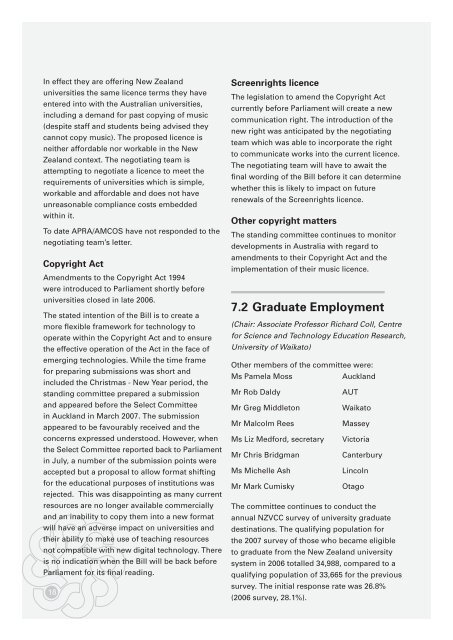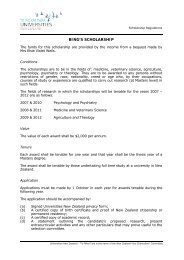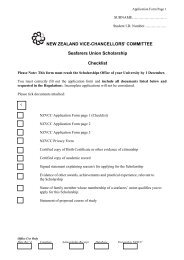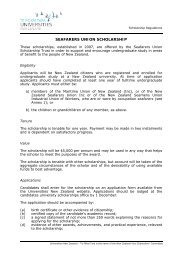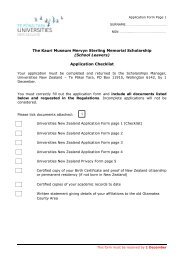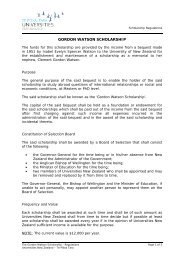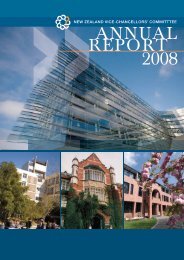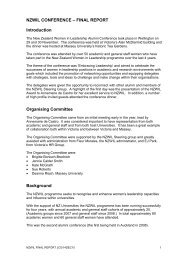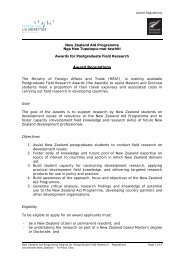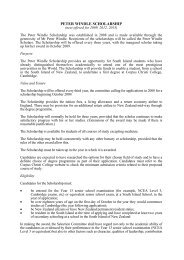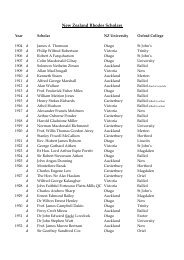New Zealand Vice-Chancellors' Committee - Universities New ...
New Zealand Vice-Chancellors' Committee - Universities New ...
New Zealand Vice-Chancellors' Committee - Universities New ...
Create successful ePaper yourself
Turn your PDF publications into a flip-book with our unique Google optimized e-Paper software.
In effect they are offering <strong>New</strong> <strong>Zealand</strong><br />
universities the same licence terms they have<br />
entered into with the Australian universities,<br />
including a demand for past copying of music<br />
(despite staff and students being advised they<br />
cannot copy music). The proposed licence is<br />
neither affordable nor workable in the <strong>New</strong><br />
<strong>Zealand</strong> context. The negotiating team is<br />
attempting to negotiate a licence to meet the<br />
requirements of universities which is simple,<br />
workable and affordable and does not have<br />
unreasonable compliance costs embedded<br />
within it.<br />
To date APRA/AMCOS have not responded to the<br />
negotiating team’s letter.<br />
Copyright Act<br />
Amendments to the Copyright Act 1994<br />
were introduced to Parliament shortly before<br />
universities closed in late 2006.<br />
The stated intention of the Bill is to create a<br />
more flexible framework for technology to<br />
operate within the Copyright Act and to ensure<br />
the effective operation of the Act in the face of<br />
emerging technologies. While the time frame<br />
for preparing submissions was short and<br />
included the Christmas - <strong>New</strong> Year period, the<br />
standing committee prepared a submission<br />
and appeared before the Select <strong>Committee</strong><br />
in Auckland in March 2007. The submission<br />
appeared to be favourably received and the<br />
concerns expressed understood. However, when<br />
the Select <strong>Committee</strong> reported back to Parliament<br />
in July, a number of the submission points were<br />
accepted but a proposal to allow format shifting<br />
for the educational purposes of institutions was<br />
rejected. This was disappointing as many current<br />
resources are no longer available commercially<br />
and an inability to copy them into a new format<br />
will have an adverse impact on universities and<br />
their ability to make use of teaching resources<br />
not compatible with new digital technology. There<br />
is no indication when the Bill will be back before<br />
Parliament for its final reading.<br />
18<br />
Screenrights licence<br />
The legislation to amend the Copyright Act<br />
currently before Parliament will create a new<br />
communication right. The introduction of the<br />
new right was anticipated by the negotiating<br />
team which was able to incorporate the right<br />
to communicate works into the current licence.<br />
The negotiating team will have to await the<br />
final wording of the Bill before it can determine<br />
whether this is likely to impact on future<br />
renewals of the Screenrights licence.<br />
Other copyright matters<br />
The standing committee continues to monitor<br />
developments in Australia with regard to<br />
amendments to their Copyright Act and the<br />
implementation of their music licence.<br />
7.2 Graduate Employment<br />
(Chair: Associate Professor Richard Coll, Centre<br />
for Science and Technology Education Research,<br />
University of Waikato)<br />
Other members of the committee were:<br />
Ms Pamela Moss<br />
Auckland<br />
Mr Rob Daldy<br />
AUT<br />
Mr Greg Middleton<br />
Waikato<br />
Mr Malcolm Rees<br />
Massey<br />
Ms Liz Medford, secretary Victoria<br />
Mr Chris Bridgman<br />
Canterbury<br />
Ms Michelle Ash<br />
Lincoln<br />
Mr Mark Cumisky<br />
Otago<br />
The committee continues to conduct the<br />
annual NZVCC survey of university graduate<br />
destinations. The qualifying population for<br />
the 2007 survey of those who became eligible<br />
to graduate from the <strong>New</strong> <strong>Zealand</strong> university<br />
system in 2006 totalled 34,988, compared to a<br />
qualifying population of 33,665 for the previous<br />
survey. The initial response rate was 26.8%<br />
(2006 survey, 28.1%).


